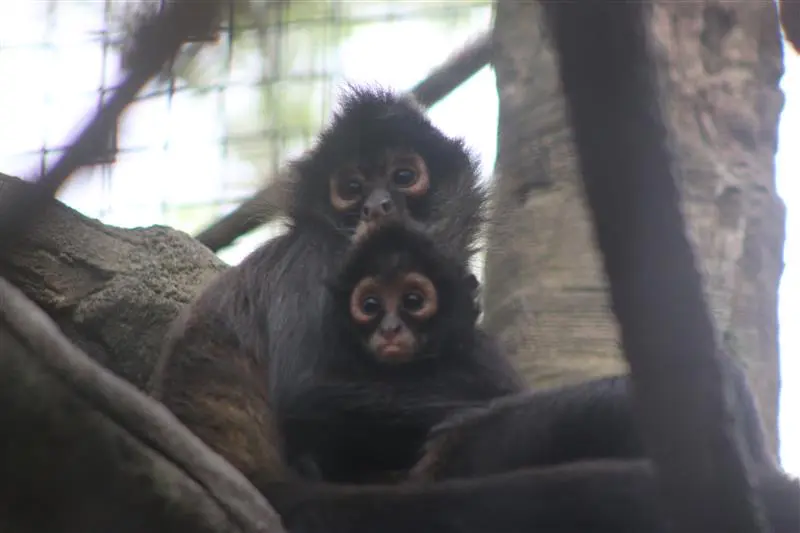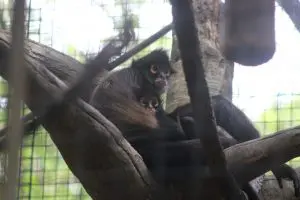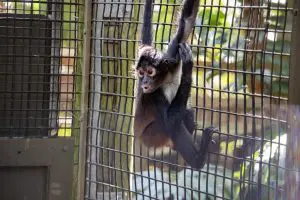

Daisy seen embracing Marceline upon meeting. Photos courtesy of Dr. Darby Proctor.
We’ve kept you up-to-date with our two rescued black-handed spider monkeys, Finn and Marceline’s, recent adventures. The duo was illegally brought into our state and found in the illegal possession of someone who didn’t have the necessary permits to own this species, according to the Florida Fish and Wildlife Conservation Commission. Their origins and their parents’ location are unknown.
Since joining our Zoo, they’ve gone from living across the boardwalk in quarantine to sharing a habitat full time with Daisy and J, two of our younger, calmer troop members. While we have introduced confiscated spider monkey infants to our troop in the past, this was our first-time acclimating everyone to two new monkeys at the same time – one of which is a female.
Through our partnership with Florida Institute of Technology (Florida Tech), we have learned about spider monkey behavior and how to best go about these introductions. Associate professor Dr. Darby Proctor, assistant professor Dr. Catherine Talbot and their students have studied our spider monkey residents since 2015, and their aid in this process was integral.
“Meeting a stranger for the first time is risky – you do not know how they are going to respond and whether they will be a friend or foe,” said Dr. Proctor regarding Finn and Marceline’s first few days up-close with troop members.

Marceline has become more outgoing since meeting Daisy.
At first, it seemed Finn would be the more outgoing individual. On his first day meeting J and Daisy, he ran right up to J and started playing while Marceline stayed back. However, once Marceline was confident enough to touch Daisy, Daisy opened her arms wide to embrace Marceline in a monkey hug.
“After that experience, Marceline has become the most open to meeting the other monkeys. She walked right up to Shooter, our alpha male, and climbed on his back the first time they met.” noted Dr. Proctor.
This was an especially sweet moment since Shooter is not typically a fan of younger monkeys being physical with him. However, he let Marceline climb right onto his back.
“I don’t want to anthropomorphize, but they are behaving as if they understand these infants need support,” said Dr. Proctor.
Historically when new infants have joined the group, the troop acts very prosocial, meaning they seem to care for each other’s welfare. This behavior is not necessarily typical of primate species when interacting with strangers. Since our troop has had experience welcoming both Mateo and J, who were also victims of the pet trade, it’s possible our troop has caught on and knows how to handle these new members.
Mateo was one of the last troop members to be introduced to Finn and Marceline. He can have an overbearing personality, and we weren’t sure if he’d adjust for the shy new members. However, Assistant Curator of Animals, Sidnee Santana-Mellor, said he did great.
“Mateo is normally an action-packed monkey with a lot of energy. He tried hard to not let his elevated behavior impact his relationship with Finn and Marceline. He was gentle and would move slowly around them, being friendly when they would show they were unsure,” Sidnee said.
Since living with select troop members full-time, Marceline in particular is thriving. She is constantly

Finn has been standoffish, but we are confident he will become more comfortable in time.
hanging out with Daisy and J, while Finn remains a bit more apprehensive, especially with the higher-ranking monkeys. However, once he learns some more social skills, we expect him to become more comfortable. This is typical behavior for an infant who was removed from their mother years before their time, but we are confident that eventually both Finn and Marceline will display the appropriate behaviors for their age and continue learning how to be a proper spider monkey.
We’ve now introduced four confiscated spider monkeys to our troop since 2020, and we’ve learned a lot along the way. Dr. Proctor is continually impressed by how accepting our monkeys are during these introductions.
“I suspect that spider monkeys have more cognitive and emotional complexity than has been documented in the literature,” she said. “As we go through the videos of these introductions, I am sure we will learn even more.”
In time, we hope to have our entire spider monkey troop integrated and functioning well all together. While there may be some quarrels as troop members continue to live together, Sidnee reminds us that “every family has their disagreements,” and we are optimistic that our now bigger troop will learn to coexist well. Finn and Marceline may go on to live in other zoos one day, but for now they’re continuing to become an important part of our Zoo family.
While we don’t know the exact circumstances that brought Finn and Marceline to our state, we want to note that vulnerable wildlife is trafficked every day around the world – including here in Florida – for the illegal pet trade.
Black-handed spider monkeys do not make good pets, but there are some important things to consider before choosing any animal for a pet. Be sure to understand where the pet came from and never take an animal from its natural home. If you don’t know where the pet came from, find another source to ensure we work together to stop the illegal pet trade of the animals we all love.
Special thanks to Flammio Financial Group, Stifel-Garvin Wealth Management Group, Artemis IT, and Jim and Darleen Barfield. Their generosity makes our work possible!
Brevard Zoo is an independent, not-for-profit organization that receives no recurring government funding for our operating costs. Your generous support enables us to continue to serve our community and continue our vital animal wellness, education and conservation programs.